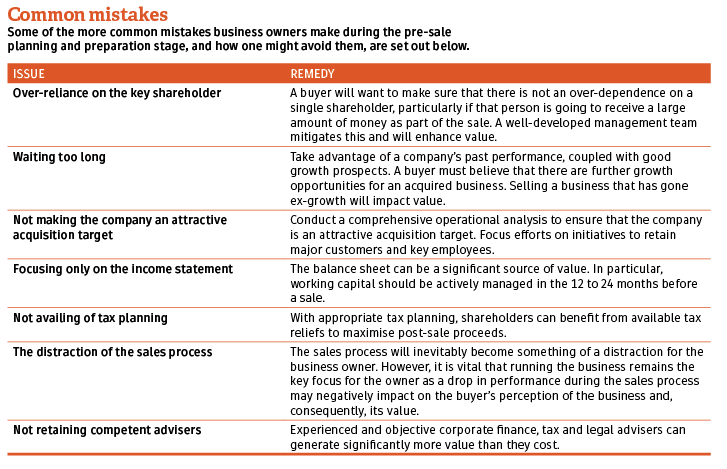Raymond Donegan and Ted Webb outline the four steps to a successful sale.
As a business owner, selling up is probably the most significant decision you will make in your working life. It is a difficult and often emotional process. However, with the right guidance, it can be navigated over a period of roughly six to eight months to everyone’s satisfaction.
Four steps, if followed, will maximise the potential for a successful sale.
Step 1: Preparation
The preparation stage sets the tone for the sale. At this point, your corporate finance adviser will draft an information memorandum with your assistance. This should be a compelling document, which will generally contain an executive summary and details of:
- business history;
- products or services offered;
- customers and market;
- future opportunities;
- overview of management, staff and facilities; and
- recent and forecast financial information.
In addition to drafting the information memorandum, a comprehensive list of potential buyers should be drawn up by you and your corporate finance adviser.
It is better to sell a business that is enjoying a period of growth with some suggestion of future growth remaining for the next owner. Also, if you want or need to retire by a specific date, it is best not to leave the sale too late.
Specific areas of preparation to address include financial items such as fixed assets, working capital such as debtors and creditors, operating expenses, and shareholder costs. It is also crucial to assess the status of non-financial items, including management structure, intellectual property, tax status, and the business’ online presence.
Step 2: Value the business and make initial contact with potential buyers
The key drivers of value from a potential buyer’s perspective are the ability of your business to generate cash and its future risk and growth prospects.
Several valuation methodologies can be used, including EBITDA (earnings before interest, tax, depreciation and amortisation) multiples, EBIT (earnings before interest and tax) multiples, and discounted cash flow.
Once value has been established, it is time to contact potential buyers. The decision on which parties to approach will depend on the nature of your business and the type of sale process you are planning.
Generally, the best result comes from a controlled auction process where several potential buyers are contacted. The benefit of this process is that, by the time the sale goes through, you will definitively know the market value of the business.
Your corporate finance adviser will ensure that interested potential buyers receive an information memorandum after signing a confidentiality agreement. Prospective buyers then have approximately four weeks to respond with non-binding indicative offers, and once the offers are received, you and your adviser will decide whom to meet.
Step 3: Management presentations and preferred buyer selection
There is no substitute for face-to-face meetings; this is arguably the most critical stage of the entire sales process. Afterwards, your corporate finance adviser will request revised offers from interested parties.
Now, you and your corporate finance adviser will decide on the preferred party. The price will play a large part in that decision, but other vital factors may include the structure of the deal and bidders’ plans for the future.
You will naturally prefer to be paid in full immediately, whereas the buyer will prefer to pay over time. Ways to reach a compromise include:
- Deferred consideration: when an element of the consideration is paid after an agreed period; and
- Earnout: when the payment of deferred consideration is conditional on achieving specific financial targets such as an agreed level of sales or profits, or non-financial milestones such as renewing a contract.
Once a preferred party is chosen, the heads of terms will be negotiated. This is a short document, which details the key financial and commercial terms of the deal.
Step 4: Due diligence and negotiations
The final stage of the process involves the preferred party undertaking due diligence on the target business, and all parties negotiating the necessary legal documents to conclude the transaction.
Due diligence is akin to an invasive audit, but it is a necessary evil. It usually lasts six to eight weeks and covers several areas including financial and tax, commercial, products/services, legal/intellectual property, human resources and pensions, environmental, technical and property. Remember, the potential buyer’s view of your business can be positively reinforced if you can provide the information promptly.
After three to four weeks of due diligence, the buyer’s lawyer will produce the first draft of the legal documents that will give effect to the sale. Assuming you are selling a company, these documents will include a share purchase agreement and a tax deed but may also feature other documents.
Conclusion
Selling a business is a complicated, lengthy exercise that most business owners will only do once in their lifetime. There can be a significant difference between a well-run, competitive sale process and a poorly executed transaction.
An experienced team of advisers will know the best techniques to enhance value and mitigate risk for you and your business. Only by engaging with such a team can you expect to maximise your position.

Raymond Donegan is Director and Head of Family Businesses at IBI Corporate Finance.
Ted Webb FCA is Managing Director at IBI Corporate Finance.
 LOADING...
LOADING...